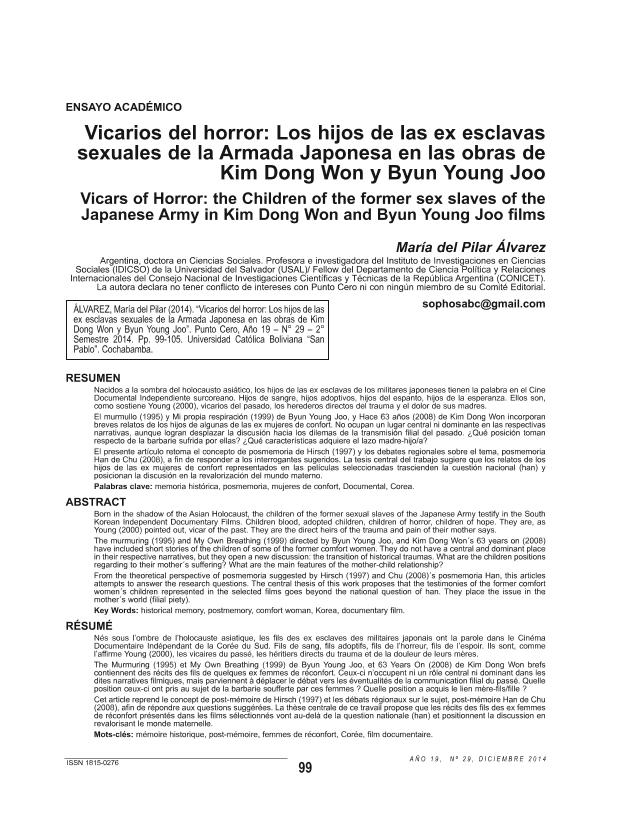Mostrar el registro sencillo del ítem
dc.contributor.author
Alvarez, Maria del Pilar

dc.date.available
2018-05-16T14:24:34Z
dc.date.issued
2014-12
dc.identifier.citation
Alvarez, Maria del Pilar; Vicarios del horror: Los hijos de las ex esclavas sexuales de la Armada Japonesa en las obras de Kim Dong Won y Byun Young Joo
; Universidada Católica Boliviana San Pablo Cochabamba; Punto Cero; 19; 29; 12-2014; 99-105
dc.identifier.uri
http://hdl.handle.net/11336/45327
dc.description.abstract
Nacidos a la sombra del holocausto asiático, los hijos de las ex esclavas de los militares japoneses tienen la palabra en el Cine Documental Independiente surcoreano. Hijos de sangre, hijos adoptivos, hijos del espanto, hijos de la esperanza. Ellos son, como sostiene Young (2000), vicarios del pasado, los herederos directos del trauma y el dolor de sus madres. El murmullo (1995) y Mi propia respiración (1999) de Byun Young Joo, y Hace 63 años (2008) de Kim Dong Won incorporan breves relatos de los hijos de algunas de las ex mujeres de confort. No ocupan un lugar central ni dominante en las respectivas narrativas, aunque logran desplazar la discusión hacia los dilemas de la transmisión filial del pasado. ¿Qué posición toman respecto de la barbarie sufrida por ellas? ¿Qué características adquiere el lazo madre-hijo/a? El presente artículo retoma el concepto de posmemoria de Hirsch (1997) y los debates regionales sobre el tema, posmemoria Han de Chu (2008), a fin de responder a los interrogantes sugeridos. La tesis central del trabajo sugiere que los relatos de los hijos de las ex mujeres de confort representados en las películas seleccionadas trascienden la cuestión nacional (han) y posicionan la discusión en la revalorización del mundo materno.
dc.description.abstract
Born in the shadow of the Asian Holocaust, the children of the former sexual slaves of the Japanese Army testify in the South Korean Independent Documentary Films. Children blood, adopted children, children of horror, children of hope. They are, as Young (2000) pointed out, vicar of the past. They are the direct heirs of the trauma and pain of their mother says. The murmuring (1995) and My Own Breathing (1999) directed by Byun Young Joo, and Kim Dong Won"s 63 years on (2008) have included short stories of the children of some of the former comfort women. They do not have a central and dominant place in their respective narratives, but they open a new discussion: the transition of historical traumas. What are the children positions regarding to their mother"s suffering? What are the main features of the mother-child relationship? From the theoretical perspective of posmemoria suggested by Hirsch (1997) and Chu (2008)"s posmemoria Han, this articles attempts to answer the research questions. The central thesis of this work proposes that the testimonies of the former comfort women"s children represented in the selected films goes beyond the national question of han. They place the issue in the mother"s world (filial piety).
dc.description.abstract
Nés sous l ombre de l holocauste asiatique, les fils des ex esclaves des militaires japonais ont la parole dans le Cinéma Documentaire Indépendant de la Corée du Sud. Fils de sang, fils adoptifs, fils de l horreur, fils de l espoir. Ils sont, comme l affirme Young (2000), les vicaires du passé, les héritiers directs du trauma et de la douleur de leurs mères. The Murmuring (1995) et My Own Breathing (1999) de Byun Young Joo, et 63 Years On (2008) de Kim Dong Won brefs contiennent des récits des fils de quelques ex femmes de réconfort. Ceux-ci n occupent ni un rôle central ni dominant dans les dites narratives filmiques, mais parviennent à déplacer le débat vers les éventualités de la communication filial du passé. Quelle position ceux-ci ont pris au sujet de la barbarie soufferte par ces femmes ? Quelle position a acquis le lien mère-fils/fille ? Cet article reprend le concept de post-mémoire de Hirsch (1997) et les débats régionaux sur le sujet, post-mémoire Han de Chu (2008), afin de répondre aux questions suggérées. La thèse centrale de ce travail propose que les récits des fils des ex femmes de réconfort présentés dans les films sélectionnés vont au-delà de la question nationale (han) et positionnent la discussion en revalorisant le monde maternelle.
dc.format
application/pdf
dc.language.iso
spa
dc.publisher
Universidada Católica Boliviana San Pablo Cochabamba
dc.rights
info:eu-repo/semantics/openAccess
dc.rights.uri
https://creativecommons.org/licenses/by-nc-sa/2.5/ar/
dc.subject
Postmemoria
dc.subject
Mujeres de Confort
dc.subject
Corea
dc.subject
Memoria Histórica
dc.subject.classification
Ciencia Política

dc.subject.classification
Ciencia Política

dc.subject.classification
CIENCIAS SOCIALES

dc.title
Vicarios del horror: Los hijos de las ex esclavas sexuales de la Armada Japonesa en las obras de Kim Dong Won y Byun Young Joo
dc.title
Vicars of horror: the children of the former sex slaves of the Japanese Army in Kim Dong Won and Byun Young Joo films
dc.type
info:eu-repo/semantics/article
dc.type
info:ar-repo/semantics/artículo
dc.type
info:eu-repo/semantics/publishedVersion
dc.date.updated
2018-05-15T19:47:23Z
dc.identifier.eissn
1815-0276
dc.journal.volume
19
dc.journal.number
29
dc.journal.pagination
99-105
dc.journal.pais
Bolivia

dc.description.fil
Fil: Alvarez, Maria del Pilar. Universidad del Salvador. Facultad de Ciencias Sociales. Instituto de Investigación en Ciencias Sociales; Argentina. Consejo Nacional de Investigaciones Científicas y Técnicas; Argentina
dc.journal.title
Punto Cero
dc.relation.alternativeid
info:eu-repo/semantics/altIdentifier/url/http://ucbconocimiento.ucbcba.edu.bo/index.php/rpc/article/view/866
dc.relation.alternativeid
info:eu-repo/semantics/altIdentifier/url/http://www.scielo.org.bo/scielo.php?script=sci_arttext&pid=S1815-02762014000200011
dc.relation.alternativeid
info:eu-repo/semantics/altIdentifier/url/http://www.redalyc.org/articulo.oa?id=421839601011
Archivos asociados
